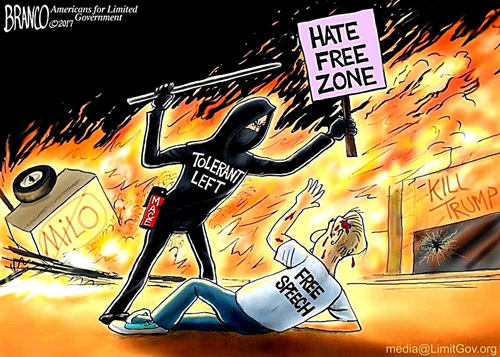by WorldTribune Staff, December 31, 2019
How far have America’s freedoms fallen? A recent statement from the assistant attorney general for the Civil Rights Division at the Department of Justice shows just how far, a columnist noted.
The DOJ’s Eric Dreiband said: “College campuses should not be mini police states.”
 Dreiband and several other attorneys filed the “Statement of Interest” in U.S. District Court on behalf of plaintiffs accusing Jones County Junior College (JCJC) in Mississippi of several egregious freedom of speech violations against students.
Dreiband and several other attorneys filed the “Statement of Interest” in U.S. District Court on behalf of plaintiffs accusing Jones County Junior College (JCJC) in Mississippi of several egregious freedom of speech violations against students.
In a statement on the DOJ website, Dreiband elaborated: “The United States of America is not a police state. Repressive speech codes are the indecent hallmark of despotic, totalitarian regimes. They have absolutely no place in our country, and the First Amendment outlaws all tyrannical policies, practices and acts that abridge the freedom of speech.”
Washington Times columnist Cheryl K. Chumley noted that “college campuses, with increasing frequency, have in fact, in some instances, become breeding grounds for police state-like hits on the First Amendment.”
The problem, Chumley wrote, “is the Left.”
Democrats and leftists, “no matter how much they talk the diversity and tolerance talk, don’t walk that walk when it comes to respecting countering viewpoints,” Chumley wrote.
The case at JCJC in Mississippi centers on an attempt by the student group Young Americans for Liberty to simply discuss the legalization of marijuana on campus. After JCJC police broke up discussions, students contacted the Foundation for Individual Rights in Education (FIRE) to sue.
“[T]hese zones function more like free speech quarantines,” FIRE wrote in May. “Worse still, students who wish to use free speech zones often have to comply with onerous requirements.”
In a December 2014 report, FIRE noted that 55 percent of U.S. colleges and universities “clearly and substantially” suppress speech. The report added that another 39 percent “could be interpreted” as suppressing speech while just 4 percent do not suppress speech.
The DOJ weighed in on the First Amendment repercussions of school administrators dictating what’s allowable speech on campus versus what’s not, and in so doing, warned of “a society in which a citizen must petition the government for permission to meet with his fellow citizens,” Dreiband wrote.
Though “a frightening scenario, in America it’s not so far off as one might imagine,” Chumley noted.
“Up until the 1980s, free speech zones on college campuses were few and far between. Nowadays? They’re simply part of the college experience.”
States such as North Carolina have stepped in and legislated against some of these zones. “But it’s not enough,” Chumley wrote. “It’s not enough for students to graduate at a college where free speech zones have been abolished only to find an entire segment of U.S. political society, the Democratic Party, has happily maintained its own free speech code book, above and beyond anything even the most speech-restrictive college administrators could have conceived.”
Chumley noted that, in August, Democrats pushed a so-called “Democracy for All Amendment” to the Constitution “that limits political rhetoric coming from the corporate and labor union worlds during election times.”
In December, California Democrat Rep. Ted Lieu said this on CNN: “I would love to be able to regulate the content of speech. The First Amendment prevents me from doing so. And that’s simply a function of the First Amendment. But I think over the long run, it’s better that government does not regulate the content of speech.”
Chumley wrote:
“The First Amendment is not the government’s guarantee of freedom of speech. It’s not a government gift; it’s not a government grant; it’s not a government promise.
“It’s a reminder to government of a God-given right to the individual. It’s a reminder to government that freedom of speech comes from God — not government.
“And that God-given freedom extends to college students on campus, as well. Only in a police state is it otherwise. There’s no other way to slice or dice it: free speech zones must go.”
Intelligence Brief __________ Replace The Media
